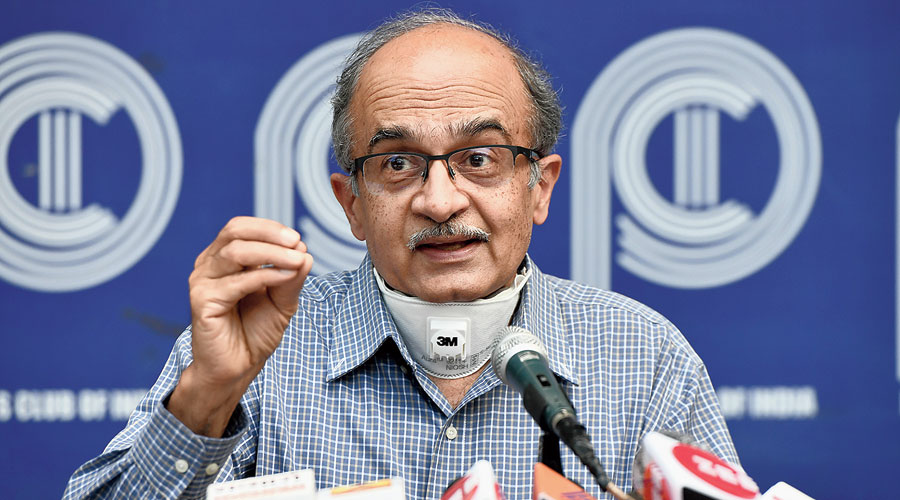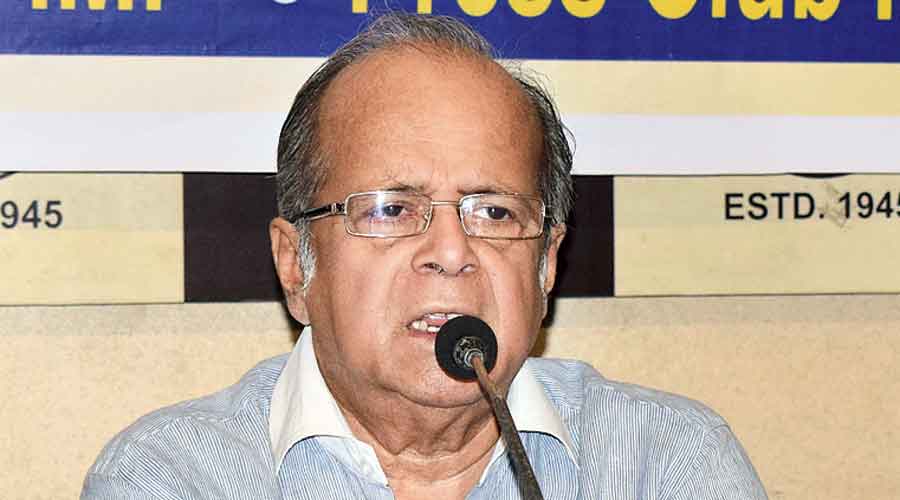There is no remedy in the country anymore, veteran lawyers said while reacting to the Babri mosque demolition verdict and cautioned that the judgment acquitting senior BJP leaders L.K. Advani, Murli Manohar Joshi and others was a recipe for lawless elements to break the law with impunity.
The critics also unanimously agreed that the foundation for Wednesday’s acquittal was perhaps laid by the five-judge Supreme Court constitution bench’s judgment on November 9 last year handing over the disputed land in Ayodhya for the construction of a Ram temple even after accepting that the demolition of the mosque had been an “egregious violation of the rule of law”.
The rights activists said it was unlikely that the CBI would file an appeal against the acquittal by the special CBI court in Lucknow, given the agency’s track record. They pointed out that the CBI had not challenged the discharge of then BJP chief and current Union home minister Amit Shah in 2014 in the alleged fake encounter killing of gangster Sohrabuddin Sheikh.
The CBI counsel has said it will decide on filing an appeal against the special court verdict after consulting its legal department.
Technically only the CBI as the prosecuting agency can file an appeal unless there is a complainant in the case who is also a party to the dispute. In the Babri case, there is no complainant other than the CBI and Uttar Pradesh police. However, the high courts under Articles 226 and 227 and the Supreme Court under Article 142 have inherent powers to order the CBI to file an appeal either suo motu or through a PIL.
Senior advocate Dushyant Dave and veteran lawyer Prashant Bhushan felt no useful purpose would be served by filing an appeal against Wednesday’s judgment.
Civil liberties lawyer Colin Gonzalves, referring to the acquittal, said: “What a shame!”
“Nobody is punished? I would say this is a very dark day for India, for which the police and the judiciary are to be blamed. Because you can smash a mosque in broad daylight after giving an assurance to the Supreme Court, completely destroy a mosque. And nobody is punished?” Gonzalves told The Telegraph.
“This naturally follows the Supreme Court judgment on Ayodhya. It follows from that. Because if you can give the mosque over to another community, you know there is no justice in this country,” he added.
The senior advocate pointed out that the law of the land states that even if a person breaks his own property, he has to first reconstruct it and then seek adjudication of the dispute.
But in the case of the Ayodhya land, Gonzalves said the Supreme Court last year allowed the arguments to proceed in the matter without first seeking the reconstruction of the demolished mosque.
“But here the court allowed arguments without insisting on reconstruction. So what it means is there is an incentive to any group to say this land belongs to A, this belongs to me. It’s an incentive to break and then finally file a suit and make a claim that this land is mine,” he said.
“Take the law first into your hands. It is an incentive to take the law into your hands. Today’s judgment is a continuation of that principle. Nothing is going to happen, nothing is going to happen. Take the law into your hands. You broke the thing in broad daylight, nothing is going to happen to you. What a shame!” Gonzalves said.
The senior advocate was dismissive of the possibility of the CBI filing an appeal against Wednesday’s verdict, saying the “CBI is his master’s voice”.
He, however, did not agree with the view that it was time to move on.
“There is no moving on. It’s like the Sikhs (in the 1984 riots). Sikhs have not got justice. How can you move on when you have lost your husbands, wives, sons and daughters in a riot, how can you move on?” Gonzalves asked.
“There is no remedy in India with a weak judiciary and a very servile police force. There is no remedy in the country anymore,” he said.
Bhushan said the acquittal was a foregone conclusion. “It was in many ways a foregone conclusion given what the court — the Supreme Court — has done by rewarding these very people with the land where these people had demolished the mosque.”
He added: “The CBI will not appeal (Wednesday’s judgment)… Just as they didn’t appeal against the discharge of Amit Shah, they are not likely to appeal.”
Bhushan went on: “It will become a very old sort of thing and more important things have overtaken the country. There is a much bigger onslaught on the minorities today than the demolition of a mosque.”
Senior advocate and Supreme Court Bar Association president Dave said the acquittal was bound to follow the Supreme Court judgment.
The lawyer felt the CBI would not challenge the verdict.
“Well, the CBI is controlled today by the executive. (Then) Chief Justice (R.M.) Lodha had said it is a caged parrot. It would be very difficult to expect the CBI to do anything. They didn’t file any appeal against the discharge of Mr Amit Shah, whose prosecution had been ordered by the Supreme Court itself. I would be very surprised if the CBI were to file an appeal,” Dave said.
The senior lawyer felt it would not be possible for any private person to file an appeal as the remedy would lie in the form of a PIL before Allahabad High Court or the Supreme Court for a direction to the CBI to lodge an appeal.
“I think time has come to forget this matter as the majority of the country wanted and the Supreme Court obliged the majority and I think we should put it behind and move on,” Dave said.
“I don’t know whether originally the complainant was a private person or not. But it would be a kind of public interest petition by a private person asking the CBI to maintain an appeal. I think such a plea can be maintained by a private person.
“But as I said, this is an exercise in futility. Everybody expected this outcome and once the Supreme Court itself overlooked the destruction of the mosque and permitted rebuilding of the temple, that was a clear sign to the district judge to exonerate all these people,” Dave said. He said India would have to accept, as was happening in Turkey and other Islamic countries where religious structures of minorities are destroyed and those of the majority community are constructed on the ruins.
“I think we must accept the position like Turkey has done. Turkey recently converted a church into a mosque. There also they have relied upon some judgment of the constitution bench of the Supreme Court of Turkey,” he added.
“India is also following the same thing that Islamic countries are doing. I think in today’s world, the majority speaks and once it speaks it should be treated as final. I don’t think anybody else should have any voice against it,”Dave said.











